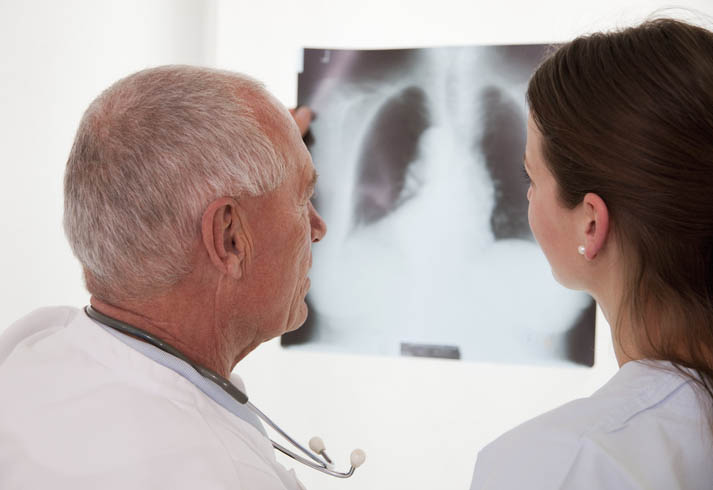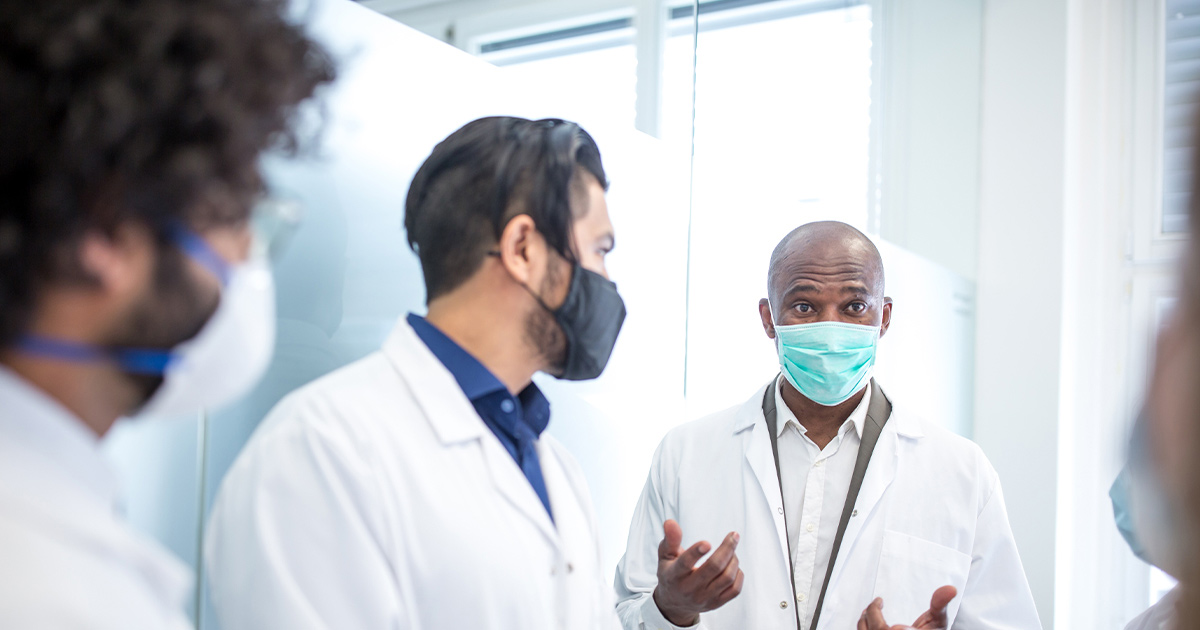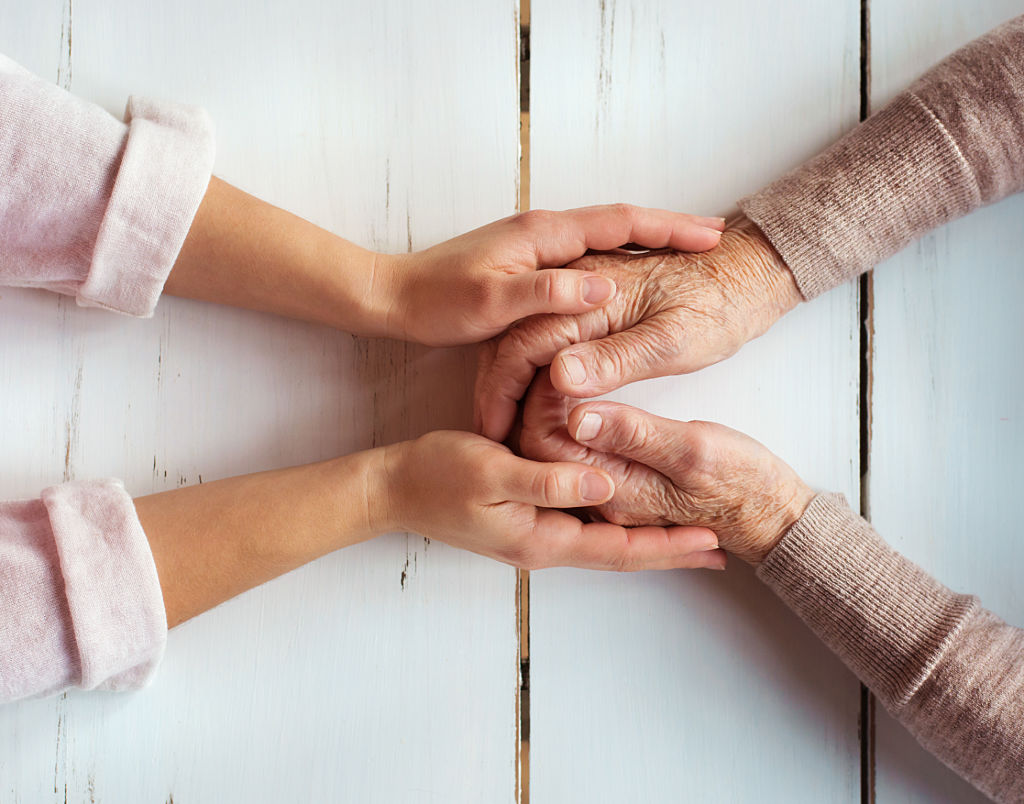Lung Cancer Screening Program
Part of Stanford Medicine Cancer Center

Leaders in Lung Cancer Screening
Although lung cancer is the leading cause of cancer death, it’s highly treatable when detected early. Our Lung Cancer Screening Program provides comprehensive screening for people at high risk for lung cancer. Our experts find signs of lung cancer in its earliest stages so you can start treatment right away.
What We Offer You for Lung Cancer
- Specialized expertise in advanced screening for people who are current or past smokers and have a high risk of lung cancer. Go to Who We Screen
- Advanced screening using low-dose computed tomography (CT) scan to detect lung cancer early, when it’s most treatable. Go to Screening
- Team-based approach to lung cancer prevention and treatment with annual lung cancer screening, prevention counseling, and referrals to Stanford Medicine cancer specialists as needed. Go to Your Care Team
- Clinical trials that offer eligible people access to the latest technologies for lung cancer screening. Go to Clinical Trials
- Comprehensive support services to help you and your family focus on health and healing. Go to Support Services
- Ease of access with lung cancer screening clinics throughout the Bay Area and virtual visits for prescreening. Go to Accessing Care
Who We Screen for Lung Cancer
For people at high risk of developing lung cancer, early detection can be lifesaving. Screening can find lung cancer before you have any symptoms or signs. Our Lung Cancer Screening Program provides screening for people who currently smoke, used to smoke, or have other risk factors for lung cancer.
At Stanford Health Care, we provide a patient-focused, coordinated approach to lung cancer screening. Our program brings together doctors with expertise in pulmonology, radiology, and oncology, so you get an accurate result and personalized follow-up care.
Lung cancer screening can identify most types of lung cancer including:
- Non-small cell lung cancer: The most common type, about 80% to 85% of lung cancers
- Small cell lung cancer: About 10% to 15% of lung cancers
- Lung carcinoid tumors: About 5% of lung cancers
- Adenoid cystic carcinomas, lymphomas, and sarcomas: Rare
Based on USPSTF 2021 Guidelines guidelines, we recommend screening if you meet all of the following criteria:
- Individuals between the ages of 50 and 80 years
- Individuals who are currently smoking or have quit within the past 15 years. Screening should be discontinued once the individual has not smoked for 15 years.
- History of at least 20 "pack years" of smoking. (A pack year equals the number of packs smoked per day times the number of years the patient smoked; two packs a day for 10 years equals 20 pack years.)
Your doctor may recommend screening if you have other risk factors for lung cancer, such as:
- Exposure to radon, a radioactive gas found in soil or rock
- Exposure to cancer-causing substances including asbestos, arsenic, beryllium, cadmium, chromium, coal smoke, diesel fumes, nickel, silica, and soot
- Personal history of other cancers such as lymphomas (cancer of cells that are part of the immune system), head and neck, or esophageal cancers
- Personal or family history of lung cancer
- History of chronic obstructive pulmonary disease (COPD) or pulmonary fibrosis
Screening
When your provider sends the referral, we contact you to make sure you’re eligible for screening. If you meet the current lung cancer screening guidelines, we then schedule your screening appointments.
Virtual prescreening
During this video visit, our advanced practice provider asks you about your medical history and risk factors for lung cancer. If you’re a current smoker, we talk to you about smoking cessation and whether you’ve tried quitting in the past.
We also provide the information you need to decide if lung cancer screening is right for you, such as:
- What the scan involves
- Why regular screening is so important
- What the findings could indicate
- The next steps we recommend based on those findings
For more information on virtual prescreening, please call 650-736-LUNG(5864).
Low-dose computed tomography (CT) screening
Our imaging specialists perform a low-dose CT scan. This imaging test uses less radiation than typical CT scans to create 3D X-rays of the chest and abdomen.
Using this technology, doctors can detect abnormalities the size of a grain of rice. Detection of smaller lung cancers leads to better treatment outcomes.
In addition, low-dose CT scans are quicker than traditional X-rays. They typically take less than a minute. That means less exposure to radiation.
Post-screening follow-up
After your lung cancer scan, your advanced practice provider reviews your results with you to help determine the next steps:
- If your scan does not show anything unusual, we make an appointment for your next scan in a year.
- If your scan shows signs of lung cancer, we refer you to a specialist in our Thoracic Cancer Program or Interventional Pulmonology Program at the Stanford Cancer Center.
Advanced Diagnostics
Lung cancer screening at Stanford Health Care involves a low-dose CT scan. The radiation dose with this test is about half of what you would receive during one year at sea level.
We have extensive experience interpreting CT scans and evaluating lung nodules, or abnormal tissue growths. Our diagnostic services have helped thousands of people understand lung cancer and plan a course of treatment.
For your convenience, we offer low-dose CT scans at locations around the Bay Area.
Clinical Trials
Clinical trials are research studies that evaluate a new medical approach, device, drug, or other treatment. As a Stanford Health Care patient, you may be eligible to participate in the latest clinical trials.
Open trials refer to studies that are currently recruiting participants or may recruit participants in the near future.
Your Lung Cancer Screening Care Team
We provide a multispecialty team approach to your care. Our team is a collection of doctors and other specialists who collaborate closely to provide streamlined lung cancer screening services. Through our collective expertise and dedication to early detection of lung cancer, we protect your health and help you get the care you need.

Your Doctors
Pulmonologist
These medical doctors diagnose and treat conditions of the respiratory system, including the lungs and their blood vessels.
View All {0} PulmonologistsRadiologist
A radiologist who specializes in lung cancer has additional training in imaging technologies, including X-ray, CT, MRI, and PET to detect and diagnose lung cancer. These doctors interpret imaging results and take biopsies, as needed, to help confirm a diagnosis.
View All {0} RadiologistsThoracic Surgeon
Our thoracic surgeons have subspecialty training in the surgical treatment of lung disorders and diseases.
View All {0} Thoracic SurgeonsAdvanced Practice Provider
Advanced Practice Providers (APPs) are registered nurses (RNs) or physician assistants (PAs) who have advanced education and clinical training. They can perform physical exams, diagnose and treat health problems, order lab work and X-rays, prescribe medicines, and provide health information.
View All 2 Advanced Practice Providers
Support Services
Accessing Care
It’s easy and convenient for you or your referring doctor to access the Lung Cancer Screening Program. We offer our screening services, including low-dose CT scans, at clinics throughout the Bay Area.
Frequently Asked Questions
Lung cancer is the No. 1 cause of death from cancer in the United States today. As with all cancers, early detection provides the best chance for successful treatment. To detect lung cancer as early as possible, the medical community recommends screening using low-dose computed tomography (CT).
Based on current guidelines, we recommend screening if you meet all of the following criteria:
- Are between age 50 to 80
- Have a history of at least 20 pack years of smoking, such as one pack a day for 20 years or two packs a day for 10 years
- Currently smoke or have stopped smoking within the past 15 years
Your doctor may recommend screening if you have other risk factors for lung cancer, such as:
- Exposure to radon, a radioactive gas found in soil or rock
- Exposure to cancer-causing substances including asbestos, arsenic, beryllium, cadmium, chromium, coal smoke, diesel fumes, nickel, silica, and soot
- Personal history of other cancers such as lymphomas (cancer of cells that are part of the immune system), head and neck, or esophageal cancers
- Personal or family history of lung cancer
- History of chronic obstructive pulmonary disease (COPD) or pulmonary fibrosis
You should not have lung cancer screening if you have:
- Pneumonia or acute respiratory infection (if you are currently sick or were treated with antibiotics in the last 12 weeks)
- CT scan of the chest within the past year
- Recent hemoptysis (coughing up blood)
- Unexplained weight loss of more than 15 pounds in the 12 months before your screening exam
Yes. The technologist can see, hear, and speak with you at all times.
Yes, you’ll change into a hospital gown and remove all jewelry, earrings, and other metal objects before the CT scan.
No, we’ll ask you to hold your breath and remain still—movement can affect the results.
We are committed to reducing exposure and following rigorous safety principles. You are exposed to a dose equal to about half the naturally occurring background radiation a person receives during one year at sea level.
Some CT tests require you to receive dye through an IV to improve the detail of the image. The iodine used for IV contrast can cause side effects such as nausea, vomiting, itching, skin rash, or headache. A low-dose CT scan does not require IV contrast.
We participate in a wide range of insurance plans. View the list of insurance plans accepted by Stanford Health Care »
If you have questions about your insurance coverage or obtaining pre-authorization for services, our Patient Financial Clearance team can help. They are available Monday – Friday, 8 a.m. – 5 p.m. to answer your questions. Please call 650-724-4445 or 1-877-291-7335 (toll free).
Yes, Stanford Health Care offers financial assistance for uninsured or underinsured people. Meet with one of our financial counselors to find the best approach to paying for your health care. Financial counselors are available Monday through Friday from 7:00 a.m. – 6:00 p.m. Learn more about financial assistance services »
To schedule an appointment, call 650-723-6855 or ask your doctor to refer you.
We participate in a wide range of insurance plans. View the list of insurance plans accepted by Stanford Health Care »
Have insurance or pre-authorization questions? The Patient Financial Clearance team is available Monday – Friday, 8 a.m. – 5 p.m., to answer your questions. Please call 650-724-4445 or 1-877-291-7335 (toll free).
Yes, Stanford Health Care offers financial assistance for patients who are uninsured or underinsured. Meet with one of our financial counselors to find the best approach to paying for your health care. Financial counselors are available Monday through Friday from 7:00 a.m. – 6:00 p.m. Learn more about financial assistance services »
We offer a number of support services, including support groups, interpreter services, nutrition services, a health library, and a variety of classes and events. Learn more about our support services »
You will need to have the following information with you when you check in:
- Insurance card
- A form of payment for any copays or deductibles
- One form of photo ID:
- Valid state-issued driver’s license
- Valid state-issued ID card
- Valid passport
- Valid U.S. military ID card
- Valid U.S. Permanent Resident Card
Please print, fill out, and return the Medical Record Release Form to your new patient coordinator. The medical release form is an authorization form for external facilities to release medical records to Stanford Health Care.
Always feel free to bring someone with you to your appointments. A family member or friend can help ask questions, remember the information your care team gives you, and provide support.
Write down your questions before your appointment and rank them in order of importance, beginning with the most important ones. If there isn’t enough time to have all your questions answered during your appointment, ask your doctor who you can speak with to get your other questions answered.
You have multiple options when it comes to paying your bill.
- Pay online:
- You can log in to MyHealth or the MyHealth mobile app to see and pay your bill.
Already have an account but need help logging in?
Contact the MyHealth Service Desk
- You can also pay as a guest to pay your bill without logging in.
- Pay by mail:
Stanford Health Care
P.O. Box 740715, Los Angeles, CA 90074-0715
Los Angeles, CA 90074-0715
- Pay by Phone:
You can call our Patient Billing Customer Service Office at
1-800-549-3720.
For our latest business hours and for more information about billing, visit our Billing page.
We offer a number of support services, including support groups, interpreter services, nutrition services, a health library, and a variety of classes and events. Learn more about our support services »
To determine if a clinical trial is right for you, talk to your doctor. He or she can refer you to a research coordinator for more information on studies that may be right for your specific condition.
You can also find the guidelines for who can participate in a particular clinical trial online. However, it is best to work with your doctor to decide the right care approach for your needs.
Many of our programs are available to international patients.
Our International Medicine Services team can help you find the right doctor, estimate medical costs, book travel, and get you information about Stanford Health Care programs and services.
Please call +1 650-723-8561 or email IMS@stanfordhealthcare.org to get started.
For our latest business hours and for more information about billing, visit our Billing page.
For Referring Physicians
PHYSICIAN HELPLINE
Fax: 650-320-9443
Monday–Friday, 8 a.m.–5 p.m.
Stanford Health Care provides comprehensive services to refer and track patients, as well as the latest information and news for physicians and office staff. For help with all referral needs and questions, visit Referral Information.
You may also submit a web referral or complete a referral form and fax it to 650-320-9443 or email the Referral Center at ReferralCenter@stanfordhealthcare.org.






